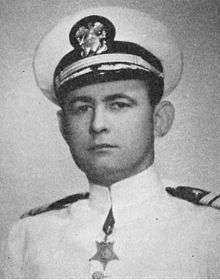Bruce McCandless
| Bruce McCandless | |
|---|---|
 | |
| Born | August 12, 1911 |
| Died | January 24, 1968 (aged 56) |
| Allegiance |
|
| Service/branch |
|
| Years of service | 1928–1952 |
| Rank |
|
| Battles/wars | |
| Awards | |
| Spouse(s) | Sue Worthington Bradley |
| Relations |
Byron McCandless (father) Bruce McCandless II (son) Sue Worthington McCandless Wooldridge (daughter) Rosemary van Linde McCandless (daughter) Douglas Montrose McCandless (son) Sir Henry Hudson Kitson (Maternal great uncle) Captain Willis W. Bradley, USN (father-in-law) |
Bruce McCandless I (August 12, 1911 – January 24, 1968) was an officer of United States Navy who received the Medal of Honor during World War II for his heroism on board the USS San Francisco (CA-38), during the Naval Battle of Guadalcanal, November 13, 1942. He retired with the rank of Rear Admiral. McCandless was the father of NASA astronaut, CAPT Bruce McCandless II, USN (Ret). Additionally, Admiral McCandless was the great-grandson of David Colbert McCanles of the Rock Creek Station, Nebraska shoot-out with Wild Bill Hickok. After that, the McCanles family changed its name to McCandless and moved to Florence, Colorado.
Early Life and Family
The son of Commodore Byron McCandless (1881–1967), Bruce McCandless was born on August 12, 1911, in Washington, D.C.. Following in his father's footsteps, Bruce graduated from the United States Naval Academy in 1932.
McCandless married Sue Worthington Bradley, daughter of Captain Willis W. Bradley, USN. They had two sons and two daughters, including NASA astronaut Bruce McCandless II.
His maternal great uncle is sculptor Sir Henry Hudson Kitson.
Military service
McCandless served on USS Indianapolis (CA-35) and USS Case (DD-370). He was serving as communications officer of San Francisco when the Empire of Japan attacked Pearl Harbor on December 7, 1941.
On November 13, 1942, during the Naval Battle of Guadalcanal, Japanese gunfire killed Rear Admiral Daniel J. Callaghan[1] and his staff, including Captain Cassin Young and all other officers on the San Francisco's bridge, except Lieutenant Commander McCandless, who took the conn for the rest of the battle. For his conduct, he was awarded the Medal of Honor, and promoted to full Commander. The San Francisco received the Presidential Unit Citation for this battle and, by the end of the war, was credited with 17 battle stars.
Cmdr. McCandless continued to serve on the San Francisco until 1944, when he took command of the newly commissioned destroyer USS Gregory (DD-802) on July 29 of the same year. On April 8, 1945, during the Battle of Okinawa, Gregory was attacked and damaged by four kamikazes and McCandless was awarded the Silver Star for conspicuous gallantry during the battle.
Captain McCandless retired on September 1, 1952, with a terminal promotion to the rank of Rear Admiral. He died in Washington, D.C., on January 24, 1968, and was buried in the Naval Academy Cemetery in Annapolis, Md.
Legacy
In 1971, the frigate USS McCandless (FF-1084) was named in honor of RADM McCandless and his father, Commodore Byron McCandless. There is also a street at the U.S. Naval Academy named after Admiral McCandless, as well as the Colorado State Veterans Nursing Home in Florence, Colorado. Commodore Byron McCandless has a street named after him at the US Naval Base, San Diego, CA.
Medal of Honor citation

For conspicuous gallantry and exceptionally distinguished service above and beyond the call of duty as communication officer of the U.S.S. San Francisco in combat with enemy Japanese forces in the battle off Savo Island, 12–13 November 1942. In the midst of a violent night engagement, the fire of a determined and desperate enemy seriously wounded Lt. Comdr. McCandless and rendered him unconscious, killed or wounded the admiral in command, his staff, the captain of the ship, the navigator, and all other personnel on the navigating and signal bridges. Faced with the lack of superior command upon his recovery, and displaying superb initiative, he promptly assumed command of the ship and ordered her course and gunfire against an overwhelmingly powerful force. With his superiors in other vessels unaware of the loss of their admiral, and challenged by his great responsibility, Lt. Comdr. McCandless boldly continued to engage the enemy and to lead our column of following vessels to a great victory. Largely through his brilliant seamanship and great courage, the San Francisco was brought back to port, saved to fight again in the service of her country.
Awards
| Medal of Honor | |
| Silver Star | |
| Purple Heart | |
| Navy Presidential Unit Citation with one star | |
| American Defense Service Medal with 'FLEET' clasp | |
| American Campaign Medal | |
| Asiatic-Pacific Campaign Medal with one silver and bronze campaign stars | |
| World War II Victory Medal | |
| National Defense Service Medal |
See also
References
- ↑ Video: America Reports On Aid To Allies Etc. (1942). Universal Newsreel. 1942. Retrieved February 21, 2012.
- This article incorporates text from the public domain Dictionary of American Naval Fighting Ships.
See "The San Francisco Story", by RADM Bruce McCandless at http://www.usssanfrancisco.org/The%20San%20Francisco%20Story.htm The Mccandless Family's Contribution to America at http://www.homeofheroes.com/a_homepage/community/misc/mccandless_family.htm
External links
- "phies of McCandless naval officers". Retrieved September 24, 2010.